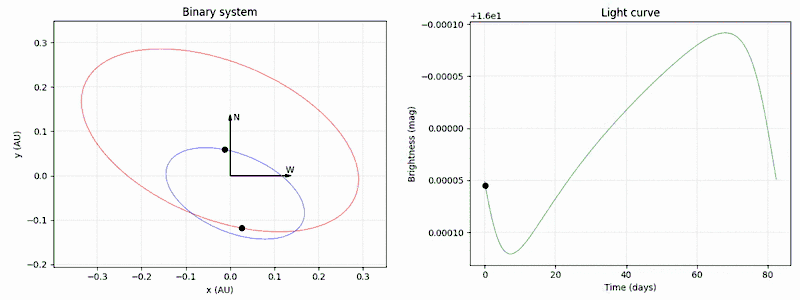This software generates a light curve of a binary system which is caused by the photometric beaming. For more details see arXiv:0708.2100. You can set up any configuration of a binary system seen from Earth.
To install the package please type from the command line:
$ sudo pip3 install bidobeor alternatively:
$ git clone https://github.com/pbrus/binary-doppler-beaming
$ cd binary-doppler-beaming
$ sudo python3 setup.py installAll you need are the doppler_beaming.py script and the binary.conf file. Edit the last one and configure your own binary system (see comments inside this file to find out which units are used):
[OBJECTS]
mass1 = 1
mass2 = 2
temperature1 = 6000
temperature2 = 8000
radius1 = 1.0
radius2 = 1.5
distance = 1000
[ORBITS]
sum_major_axis = 8e10
eccentricity = 0.4
longitude_node = 70.0
inclination = 60.0
periastron_argument = 110.0
...Now you can run the doppler_beaming.py:
$ python3 doppler_beaming.pyThe main module bidobe (binary doppler beaming) provides the interface to display, save to files and animate orbits, radial velocities and light curves. Moreover, it allows to convert SI units from and to astronomical units. For example:
orbit1_position = orbit1.convert_m_to_au(orbit1_position)converts position in meters to position in AUs. The following commands:
plot_projected_orbits(orbit1_position, orbit2_position, "AU", "AU")
plot_projected_orbits(orbit1_position, orbit2_position, "AU", "AU", "orbits.eps")
animate_projected_orbits(orbit1_position, orbit2_position, "AU", "AU")can be used to display orbits projected on the sky, save them to orbits.eps file and animate them on the screen, respectively.
I encourage to visit my website to see more detailed description of this project. The current link can be found on my GitHub profile.
Binary-doppler-beaming is licensed under the MIT license.


